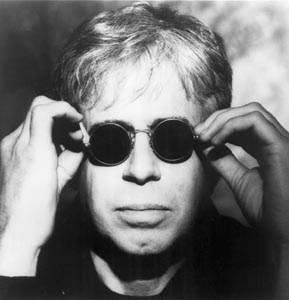![[MetroActive Music]](/gifs/music468.gif)
[ Music Index | Sonoma County | MetroActive Central | Archives ]
Personal Touch
Folk-rocker Bruce Cockburn's other side
By Alan Sculley
LIKE MANY ARTISTS whose music sometimes contains a topical thread, Bruce Cockburn has often seen his songs divided into two distinct camps--the ones that are political and the tunes that are personal in nature. To Cockburn, that sort of categorization misses the major point behind his music.
"They're all the same," Cockburn says of his songs. "They all come from the same place. I understand the convenience of that distinction between the personal and the political song, but for me there's no distinction. When I address an issue, for want of a better way to say it, it's because that issue has touched me in some way and aroused an emotional response that produces a song. The same thing is true of songs about personal growth or spiritual things or sex or stupid things people do.
"The political songs, although some people may not see them this way, to me are not manifestos or anything," he said. "They're attempts to share my feelings about something with people. The something may be an issue people have not been aware of before or maybe one that everybody's out of their minds [about]. But this is how it touched me."
Having released his 25th CD last year, Breakfast in New Orleans, Dinner inTimbuktu (Ryko), the Toronto-based Cockburn has certainly covered extensive territory within his music in the 30 years since he released his first album.
As he suggests, Cockburn, 54, has written his share of intensely personal songs. Since he's a Christian, spirituality has been a recurring, if often subtle, theme.
Cockburn, of course, has also written his share of pointedly political material. In fact, one of his biggest hits in the United States, the 1985 song "If I Had a Rocket Launcher," was triggered by his travels to Guatemala, where he witnessed firsthand the horrors of civil war in that Central American country. He recently performed at the Luther Burbank Center--where he returns next week--with Emmy Lou Harris, Steve Earle, and others at a Landmine-Free World benefit concert, and his 1997 CD Charity of the Night featured a track, "Mines in Mozambique," about how that country is one of the most heavily mined regions on the globe.
Cockburn has no problem with people who don't care to tune in when he writes about political or social events. Of course, he will point out that even though the problems of Guatemala or Mozambique may seem far removed from the lives people lead in the United States or Canada, such events have more impact than many people realize.
"People are busy. Not everybody has the energy or the inclination to look very far beyond their immediate concerns," he says.
"But the fact is that what goes on in every part of the world affects every other part of the world. And while people may not choose to notice it or may be uncomfortable noticing it, a war in Central America has led to the existence of garment sweatshops in Central America, which is taking work away from U.S. garment workers, for instance. It comes home.
"Everything comes home."
Breakfast in New Orleans, Dinner in Timbuktu is the latest example of Cockburn's political involvement filtering into his music. Many critics have called it one of the most personal CDs of Cockburn's career. Possibly the most overtly political tune on Breakfast is "Let the Bad Air Out," a rather humorous half-sung, half-rapped rant about government corruption.
BUT COCKBURN says the latest CD was flavored by yet another of his fact-finding journeys. In 1998 he was invited to participate in the making of a documentary on the efforts of people in Mali in West Africa to reverse the effects of desertification.
"The issue of desertification is aggravated in Mali because of its proximity to the Sahara," Cockburn explains, noting that Mali borders that famous desert. "My role in the film is just to kind of be the eyes of the North American, basically, looking at how people live, particularly with respect to the issue of desertification. It's a problem in a lot of places, but very obviously so in Mali.
"We ended up with a pretty good little film, I think."
The new CD bears many of the stylistic and sonic trademarks of Cockburn's work. Though a bit more acoustic and spare than his recent records, new songs such as "Last Night of the World" (a song that got considerable radio play last year) and "The Embers of Eden" find Cockburn striking his familiar understated blend of folk, blues, and rock.
But perhaps the most intriguing moment on Breakfast in New Orleans, Dinner in Timbuktu is Cockburn's unconventional cover of Fats Domino's "Blueberry Hill." Judging by the mixed critical response the song has received, it is also the most controversial song on the CD.
Those used to the strolling original will be startled to hear "Blueberry Hill" turned into a languid version built around chiming guitars and a meditative tempo. This pace allows a real sense of sadness to emerge within what many consider a nostalgic good-time song.
"It's one of the features of a song that becomes hugely popular and so much a part of the landscape that you tend to forget that it actually says something," Cockburn notes.
"And that song, the reason it became popular is because it talks about an emotional experience that lots of people have had."
[ Sonoma County | MetroActive Central | Archives ]
Copyright © Metro Publishing Inc. Maintained by Boulevards New Media.
![]()

O Canada: Bruce Cockburn returns to the Luther Burbank Center next week.
Bruce Cockburn performs Tuesday, Feb. 15, at 8 p.m. at the Luther Burbank Center, 50 Mark West Springs Road, Santa Rosa. Tickets are $25. 546-3600.
From the February 10-16, 2000 issue of the Sonoma County Independent.